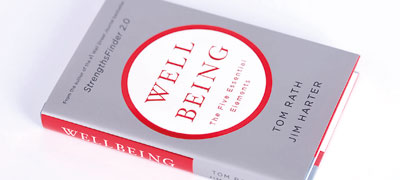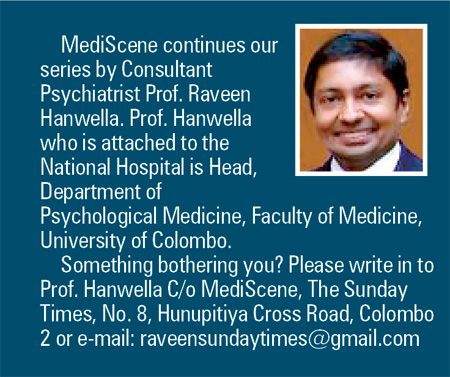Five key points for human wellbeing
The results of a worldwide Gallup poll identified five essential elements for human wellbeing: Career, social, financial, physical and community wellbeing. Last month I discussed the first two elements and this month I will write on the last three.
 Financial wellbeing
Financial wellbeing
Surprisingly the amount of money you have is not the best measure of your financial wellbeing. Studies show that your income matters but only to the point at which you have enough to satisfy basic needs. For a large number of persons inhabiting lower income countries, money is essential for meeting basic needs. If you do not have enough money you might well have to go without food. In middle to higher income countries, the differences in wellbeing are more due to the day-to-day comforts and enjoyment that money affords. Persons with more money can choose when and what they do with the money. It gives them control on how they spend their time.
Can we buy wellbeing? In a Harvard research, participants received an envelope containing either 5 or 20 dollars to spend in a day. They were randomly assigned to spend it on themselves or others. At the end of the day, the amount of money spent had no relationship to the level of happiness whereas those who spent the money on others reported significantly higher levels of happiness.
When we are depressed, we may go on a spending spree. A study showed that persons shown a video with a sad story spend four times more on a product compared to those who did not watch the video. So, do not make major financial decisions when you are in a bad mood. Wait for a better time.
On what should you spend your money? Should you buy that great looking dress or fancy camera or spend your money on a vacation or going out for a meal? In short, would you be better off spending on material goods or experiences? Studies show that though we immediately feel better after a purchase our satisfaction with material goods reduces after a time. But if you spend on experiences you get a triple benefit; the anticipation of the experience, the actual event and later the joy of fond memories of the occasion.
 How should we save our money? In the Gallup poll, people who had goodFinancial Wellbeing were not necessarily rich. But they had enough money for their needs and were not stressed by financial worries. They had a consistent plan for saving money even though it was not a large amount. Accumulation of wealth was not their goal as focusing solely on this goal reduced wellbeing but with what they had these people felt financially secure.
How should we save our money? In the Gallup poll, people who had goodFinancial Wellbeing were not necessarily rich. But they had enough money for their needs and were not stressed by financial worries. They had a consistent plan for saving money even though it was not a large amount. Accumulation of wealth was not their goal as focusing solely on this goal reduced wellbeing but with what they had these people felt financially secure.
From the poll, there were three main recommendations for boosting financial wellbeing. The first, buy experiences rather than material goods. Second, spend on others rather than solely on yourself. Third, establish default systems for consistently saving money.
Physical wellbeing
As defined by the authors of Wellbeing: The Five Essential Elements, “Physical Wellbeing is about having good health and enough energy to get things done on a daily basis.”About a quarter of the world’s population (around 1.5 billion) experience pain and are unable to function as others of their age group. One third of Americans are obese, one of the highest rates in the world. In Sri Lanka too, obesity rates high, nearly 25% in urban areas. This impacts not only on the persons affected but due to the high economic burden on their families, the countries concerned.
Again, from Wellbeing: The Five Essential Elements, “People who exercise at least two days a week are happier and have significantly less stress. In addition, these benefits increase with more frequent exercise. We found that each additional day of exercise in a given week — at least up to six days when people reach a point of diminishing returns — continues to boost energy levels.” Yet among Americans, only 27% exercise the recommended 30 minutes or more of exercise five days per week. In Sri Lanka, the figures may be even lower. A study showed that just 20 minutes of exercise improves your mood for several hours afterwards.
The next ingredient for physical wellbeing is healthy eating. Does an empty stomach make you hungry? Yes, but did you know that there are some foods that can make you even more hungry? Foods high in carbohydrates and sugars sends a message to the brain to consume even more even if we don’t need more food. That’s why you can’t stop eating sweets until the box is finished. Foods high in unsaturated fats such as avocados, nuts and olive oil send a message asking our brains to stop eating.
An easy way to buy healthy foods when shopping is to look for fruits and vegetables with dark tones of red, blue and green. Unfortunately, in Sri Lanka, the reds such as apples, strawberries and red peppers except for tomatoes and the blues, blackberries, blueberries and grapes are expensive. But we do have plenty of dark green leaves.
The third component for physical wellbeing is sleep. Many of us sleep less than the recommended seven to eight hours of sleep per night. Sleep is essential not only for resting our minds and our bodies but our learning accelerates while we sleep. A night’s sleep enables our brain to process and consolidate what was learnt the day before. So, students, who are in the habit of doing ‘all-nighters’ prior to an examination take care, it would be far more beneficial for you to have a good night’s sleep.
Over time a lack of sleep has also been shown to increase the overall risk of death. Sleep is an essential component of Physical Wellbeing.
Community wellbeing
It matters where you live. The quality of your environment matters for your wellbeing. Do you feel safe walking alone at night in your neighbourhood? If the answer is yes, you have another primary ingredient for wellbeing. Unfortunately, millions of people in countries around the world do not have this security.
Living in the right surroundings is not enough. You may like your privacy but if you live isolated from your neighbours, as it now happens in our cities, it will impair your wellbeing. You need to make connections with your community. Active involvement in community groups or organizations will connect you to a wider network of friends. Community wellbeing also involves giving back to others either in terms of money or your time.
The authors of Wellbeing make three recommendations for improving your Community Wellbeing. The first, identify how you can contribute to your community based on your personal mission, Second, tell people about your passions, and interests so they can connect you with relevant groups and causes. Third, opt into a community group or event. Even if you start small, start now.
Excellent advice indeed. Follow it and your life will be truly worthwhile.
( Dr. Hanwella’s book ‘How to Manage Your Mind’ is now available at Sarasavi Bookshop Nugegoda


